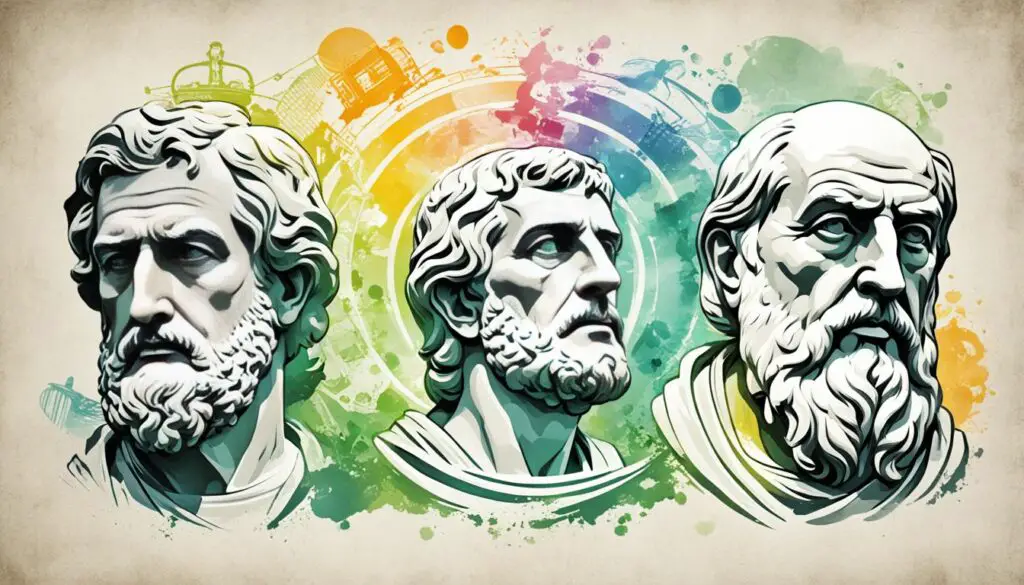O hedonism and the stoicism are two ancient philosophies that offer valuable guidance for modern life. O hedonism emphasizes the search for pleasure and personal satisfaction as sources of felicidade, while the stoicism teach the emotional balance, search for virtue and acceptance of events as paths to a virtuous life and peaceful. Both philosophies offer meaningful perspectives on how to live a full and satisfying life.
Main points to be considered:
- O hedonism and the stoicism they are ancient philosophies that can provide useful guidance for modern life.
- Hedonism focuses on search for pleasure and personal satisfaction as sources of felicidade.
- Stoicism emphasizes the emotional balance, search for virtue and acceptance of events as ways to live a fulfilling life.
- Both philosophies aim to provide a virtuous life and a personal satisfaction lasting.
- Exploring these philosophies can help you find a healthy balance between pleasure and virtue in everyday life.
Characteristics of Stoicism
Stoicism is a philosophical current that emerged in Ancient Greece, marked by unique and distinctive characteristics. These essential aspects define the stoic philosophy as a search for virtue, indifference in relation to material goods, acceptance of fate and live in accordance with nature.
The Stoics believed that the virtue it was the path to a full and truly satisfying life. For them, the virtue it meant acting in accordance with reason and living ethically in all aspects of life.
A indifference in relation to material goods was one of the central characteristics of Stoicism. The Stoics believed that the true felicidade it could not be found in the unbridled pursuit of wealth, fame or power. Instead, they valued personal integrity, honesty, and simplicity.
A acceptance of fate it was a fundamental belief of the Stoics. They believed that all events were determined by a cosmic force and that it was useless to resist what was already predestined. Instead, they defended an attitude of acceptance and serenity in the face of circumstances.
Living in accordance with nature was the key for the Stoics to achieve happiness and inner harmony. They believed that all things and events were part of a cosmic order and that they should be accepted as such. By living in accordance with nature, the Stoics sought a balance and serenity that transcended the ups and downs of everyday life.
Stoicism offers a unique insight into human existence, emphasizing the importance of virtue, indifference material, the acceptance of fate and life in accordance with nature. These characteristics shape a philosophy that seeks inner harmony and a way of living that goes beyond external circumstances. The Stoics believed that true happiness was available to those who followed these principles in their daily lives.

| Characteristics of Stoicism | Overview |
|---|---|
| Search for virtue | The Stoics believed that acting in accordance with reason and living ethically were essential to achieving happiness. |
| Indifference towards material goods | They valued personal integrity, simplicity and honesty, leaving aside the unbridled search for wealth and power. |
| Acceptance of fate | They believed that accepting what was already predestined was wiser than resisting the inevitable. |
| Life in accordance with nature | By living in accordance with nature, they sought to achieve a balance and serenity that went beyond external circumstances. |
Characteristics of Hedonism
Hedonism is an ethical doctrine that seeks pleasure as the purpose of human life. Hedonists believe that search for pleasure is what motivates human actions and that happiness is directly linked to personal satisfaction and the enjoyment of life's pleasures. However, hedonism does not preach the unbridled search for pleasure, but rather the search for natural pleasures, which are in harmony with human nature. Unnatural pleasures, such as drug use or the pursuit of power and fame, are considered less desirable by hedonists.
To better understand the characteristics of hedonism, it is important to consider the hedonistic philosophy as a search for a full and satisfying life. Contrary to what many may think, hedonism is not just about satisfying momentary desires, but about finding a balance between the search for pleasure and lasting happiness. Hedonists argue that happiness cannot be achieved only through superficial and ephemeral pleasures, but through the enjoyment of pleasures that are inherent to human nature.
“Pleasure and happiness are directly linked to personal satisfaction and the enjoyment of life’s pleasures.”
Hedonists recognize that there are different types of pleasures and that not all of them bring the same satisfaction. Therefore, they distinguish between natural pleasures e unnatural pleasures. Os natural pleasures are those that are in accordance with our human nature, such as the search for healthy foods, social contact, physical exercise and artistic appreciation. Unnatural pleasures are those that move away from this natural harmony, such as substance abuse, the unbridled search for status and power, or the search for pleasures that cause suffering to others.
It is important to highlight that hedonism does not preach the irresponsible search for pleasure, but rather the search for self-sufficient and balanced satisfaction. Hedonists recognize that excessive pleasure can lead to dissatisfaction and existential emptiness. Therefore, the hedonistic philosophy encourages the search for pleasures that contribute to a full and meaningful life, promoting lasting and genuine satisfaction.
To illustrate the characteristics of hedonism, below is a comparative table between natural pleasures and unnatural pleasures:
| Natural Pleasures | Unnatural Pleasures |
|---|---|
| Healthy eating | Use of drugs |
| Practice of physical activity | Unbridled search for power |
| Social and emotional contact | Search for fame |
| Artistic appreciation | Destructive behaviors |
Through this table, it is possible to observe the difference between natural pleasures, which are healthier, more satisfying and lasting, and unnatural pleasures, which can bring negative consequences to personal and social life.

Phases and Main Thinkers of Stoicism
Stoicism, one of the most influential philosophical currents in history, has gone through important phases over time. Understanding these phases and main thinkers of Stoicism helps us appreciate the evolution and impact of this philosophy in different eras. Here, we will explore these phases and meet some of the most important Stoic thinkers.
Phase 1: Foundation of Stoicism
The first phase of Stoicism began with Zeno of Citium, founder of the Stoic school, who lived from 334 BC to 262 BC He elaborated the fundamental principles of Stoicism and was succeeded by Cleantes, who expanded and developed his ideas. Crisippus of Soils, in turn, was responsible for systematizing the stoic philosophy and for the defense of Stoicism against criticism from other philosophical schools.
Phase 2: Transfer to Rome
The second phase of Stoicism occurred with the transfer of philosophy to Rome. Diogenes of Babylon He was one of the first Stoics to take philosophy to the capital of the Roman Empire, where he began to influence Roman intellectuals. Other important thinkers of this phase include Pannetius of Rhodes, who was responsible for introducing Stoicism to the Roman aristocracy, and Posidonium of Apaméia, who wrote extensively about Stoicism and exerted great influence on the period.
Phase 3: Latin Strand
The last phase of Stoicism was known as the Latin branch and is marked by the contributions of important Roman Stoic thinkers. Seneca, Roman philosopher and statesman, is considered one of the most influential among them. Your stoic philosophy emphasized the role of virtue and the search for emotional balance. Epictetus, a Stoic philosopher of Greek origin, preached the acceptance of events and the importance of finding internal satisfaction. Finally, Marcus Aurelius, Roman emperor and Stoic philosopher, wrote “Meditations”, a work that reflected on Stoic teachings and their practical application in everyday life.
Understanding these phases and main thinkers of Stoicism allows us to appreciate the diversity of ideas and the lasting legacy of this philosophy, which continues to be studied and applied today.
Main Thinkers of Stoicism
| Thinker | Period |
|---|---|
| Zeno of Citium | 334 BC – 262 BC |
| Cleantes | 316 BC – 232 BC |
| Crisippus of Soils | 279 BC – 206 BC |
| Diogenes of Babylon | 230 BC – 150 BC |
| Pannetius of Rhodes | 185 BC – 109 BC |
| Posidonium of Apaméia | 135 BC – 50 BC |
| Seneca | 4 BC – 65 AD |
| Epictetus | 55 AD - 135 AD |
| Marco Aurelio | 121 AD - 180 AD |
These thinkers were essential to the understanding and development of Stoicism over the centuries, and their ideas continue to influence scholars and philosophers to this day.

The Search for Happiness
Both hedonism and stoicism argue that pursuit of happiness It is a central goal of human life. Hedonism believes that pleasure is the source of happiness and that the pursuit of pleasure brings personal satisfaction and emotional well-being. Stoicism teaches that happiness lies in virtue and emotional balance, and not in the unbridled search for pleasure. For the Stoics, personal satisfaction can only be achieved through accepting events and seeking fulfillment. inner tranquility.

Both philosophies offer unique perspectives and principles for achieving a full and satisfying life. While hedonism seeks pleasure as the main source of happiness, stoicism values virtue and emotional balance as fundamental to a healthy life. virtuous life.
Pleasure is the source of happiness.
Hedonism believes that pleasure is an essential aspect of human life. Seeking pleasure and satisfying our desires provides personal satisfaction and emotional well-being. However, it is important to emphasize that hedonism does not advocate the unbridled search for pleasure at any cost. Instead, hedonists value the pursuit of natural pleasures, which are aligned with human nature and which provide authentic and lasting satisfaction.
- Natural pleasures include enjoying a tasty meal, spending time with loved ones, appreciating works of art, and enjoying nature.
- Unnatural pleasures, such as excessive drug use, harmful addictions, and the pursuit of fame or power, are considered less desirable by hedonists.
Happiness lies in virtue and emotional balance.
On the other hand, Stoicism teaches that happiness lies in the ability to live in accordance with virtue, seeking personal and moral development. Stoics believe that happiness can only be achieved through self-control and emotional balance. Accept life events with inner tranquility and acting in accordance with human nature are essential principles of Stoicism.
- Accepting events: Stoics value acceptance of life events, recognizing that we cannot always control external circumstances. Instead, we must accept adversities with equanimity and find ways to deal with them virtuously.
- Inner tranquility: Search for inner tranquility it is a constant quest for Stoics. Cultivating emotional balance is essential for dealing with life's challenges and finding personal satisfaction.
In short, both hedonism and stoicism offer different paths to seeking happiness and personal satisfaction. Whether through pleasure and the enjoyment of natural pleasures in hedonism, or through virtue and emotional balance in Stoicism, both philosophies invite us to reflect on what really brings us happiness and to seek a virtuous and meaningful life.
The Lost Art of Friendship
The Stoics valued the friendship as a virtue of friendship essential for a good and meaningful life. They believed that healthy relationships e interpersonal connections were fundamental to the sense of community, emotional support and personal satisfaction. friendship it was seen as an expression of virtue and a means of mutual support. The Stoics saw the friendship as a form of community and believed that cultivating it was a way of living in accordance with human nature.

True friendships are one of the greatest sources of happiness and well-being. Having someone we can trust, with whom we can share our joys and sorrows, is a priceless gift. A friendship It gives us a sense of belonging and helps us face life's challenges with more courage and determination.
In the modern world, we are often so busy with our lives that we end up neglecting healthy relationships and the importance of cultivating meaningful friendships. However, it is essential to remember that interpersonal connections are fundamental to our happiness and emotional well-being.
To grow healthy relationships and rescue the lost art of friendship, it’s important to invest time and effort into building and maintaining meaningful connections. This involves being there for friends, listening carefully, offering support and being a source of comfort in difficult times.
Furthermore, it is essential to practice empathy and compassion, putting ourselves in someone else's shoes and understanding their needs and feelings. A friendship True faith is based on reciprocity, mutual respect and unconditional acceptance.
Um sense of community is fundamental to the construction of healthy relationships. Participating in group activities, collaborating on community projects, or getting involved in interest groups can help you expand your social network and meet like-minded people.
Finally, remember that the emotional support It's an essential part of a healthy friendship. Be there for your friends when they need support, and allow yourself to ask for help when you're going through difficult times. True friendship is built on a foundation of trust and mutual support.
In summary, the lost art of friendship reminds us of the importance of cultivating healthy relationships and value the interpersonal connections. True friendship brings joy, satisfaction and emotional support, making life more meaningful and rewarding.
Value your Time: Don’t Postpone Life
Both hedonism and stoicism emphasize the importance of enjoying the present moment and not postponing pleasure and happiness until the future. After all, life is made up of unique and precious moments that we should make the most of. Carpe Diem, as the ancients would say.
The Stoics remind us of the impermanence of life and the importance of valuing time as a valuable resource. Time waits for no one, and postponing happiness until the future can deprive us of valuable moments and meaningful experiences.
Understand the awareness of impermanence It makes us appreciate the present more intensely. Every moment we fail to enjoy is a moment lost forever. Therefore, we must live the present moment with awareness and fullness.

We should not leave for tomorrow what we can experience today. A pursuit of happiness should not be postponed or postponed. We must be aware that life is ephemeral and understand the importance of making the most of every moment.
“Yesterday is history, tomorrow is a mystery, but today is a gift. That’s why it’s called a gift.” – Master Oogway
By valuing the present, we experience self-sufficient satisfaction and find the true meaning of life. We do not worry excessively about the future or the past, but rather focus on experiencing each moment fully and consciously.
- Live in the present moment.
- Savor the little things in life.
- Make your dreams come true now.
- Love and appreciate the people around you.
- Take advantage of the opportunities that arise.
Time is a precious gift that we cannot waste. Therefore, do not postpone happiness, live in the present and enjoy every moment with wisdom and gratitude.
How to Overcome Worry and Anxiety
Both hedonism and stoicism offer approaches to dealing with concern and anxiety. Stoics believe that it is important to develop emotional balance and acceptance of events to avoid concern excessive. They also recommend practicing self-care and relaxation techniques to alleviate the anxiety. Hedonism, in turn, encourages focus on the present and the search for pleasure as ways to combat concern and anxiety.
Relaxation Techniques
To combat worry and anxiety, there are several relaxation techniques that can be practiced regularly. Some of them include:
- Deep and conscious breathing;
- Meditation and mindfulness;
- Practice of physical exercises;
- Yoga and stretching;
- Visualization and guided imagination techniques;
- Listening to relaxing music;
- Relaxing baths;
- Massages and other body care.
These practices help promote emotional balance, reduce stress and alleviate anxiety, providing greater general well-being.
Acceptance of Events
One of Stoicism's main approaches to dealing with worry and anxiety is acceptance of events. The Stoics understood that we can't always control what happens around us, but we can control how we react to those events. Accepting events as part of human nature and the cosmic order helps reduce excessive worry and anxiety. When practicing acceptance, focus on developing the self-control and find inner tranquility, even in the face of adversity.
“What worries a man is not the facts themselves, but the opinion he has about them.” – Epictetus
This quote from Epictetus highlights the importance of how we interpret events in our mind and how this can affect our worry and anxiety. By changing our perspective and adopting a more balanced view of events, we can face challenges with greater serenity.
Focus on the Present
Hedonism also offers an approach to combating worry and anxiety, through focus on the present. By directing our attention to the present moment and fully enjoying the experiences and pleasures of the present, we can reduce worry about the past or future. This practice helps us cultivate a state of greater presence and satisfaction in the here and now.
To achieve emotional balance and reduce worry and anxiety, it is recommended to combine self-care practices and relaxation with the acceptance of events and the focus on the present. Each person can find the techniques that work best for them and adapt them according to their needs and preferences.
How to Tame Adversity
Both hedonism and stoicism recognize the inevitable presence of adversity in life. Stoics believe that the adversity is an opportunity to strengthen the inner strength and develop the resilience. They encourage facing challenges head on and Overcome obstacles as a way of personal growth. Hedonism, on the other hand, emphasizes the importance of finding gratification and pleasure even in adverse situations.
A resilience is a valuable skill that allows us to better deal with adversity and face the challenges that arise throughout life. By being resilient, we are able to find inner strength for Overcome obstacles and transform difficulties into opportunities for personal growth.
Adversity is like a fire that burns, but also shapes. It is through difficulties that we discover our true self inner strength.
To tame adversity, it is important to cultivate a resilient mindset. This involves not only facing challenges, but also learning to deal with the negative emotions that may arise during these moments. It is essential to accept that not everything is under our control and that it is normal to feel shaken in the face of adverse situations.
A helpful approach to dealing with adversity is to practice acceptance and letting go. This does not mean passively resigning ourselves to circumstances, but rather recognizing and accepting the things we cannot change. By developing the ability to accept and adapt to difficulties, we can reduce stress and find constructive ways to deal with challenges.
Furthermore, it is essential to look for sources of emotional support. Having a support network, whether made up of friends, family or professionals, can be extremely beneficial when facing adversity. Sharing our feelings and experiences with trusted people can provide us with emotional relief and help us find different perspectives on the situation.
Adversity can be an opportunity to personal growth. Ao Overcome obstacles, we develop internal skills and resources that can make us stronger and more resilient. It is important to remember that our adverse experiences shape us and provide us with valuable lifelong learning.
So when facing adversity, remember that you are capable of overcoming challenges and finding the inner strength to move forward. Cultivate the resiliencesearch emotional support and find constructive ways to face difficulties. With determination and perseverance, you can turn adversity into an opportunity for personal growth.

| Challenges | Resilience |
|---|---|
| Stressful situations | Ability to deal with stress in a healthy way |
| Personal losses | Ability to adapt and find meaning in painful experiences |
| Failures and rejections | Resilience to persist and seek new opportunities |
| Unforeseen changes | Ability to adapt to new circumstances and find creative solutions |
Conclusion
Hedonism and Stoicism are two ancient philosophies that offer valuable guidance for modern life. A hedonistic philosophy emphasizes the search for pleasure and personal satisfaction as sources of happiness. A virtuous life, from a hedonistic point of view, is one that seeks to maximize natural pleasures in harmony with human nature, avoiding unnatural pleasures.
Stoic philosophy, on the other hand, teaches emotional balance, the search for virtue and the acceptance of events as paths to a virtuous and peaceful life. Stoics value the self-control and inner tranquility as a means of achieving self-sufficient satisfaction and serenity in the face of life's adversities.
Both philosophies offer meaningful perspectives on how to live a full and satisfying life. While hedonism seeks pleasure as a source of happiness and personal satisfaction, Stoicism focuses on the search for virtue, self-mastery and emotional balance as the path to a virtuous and peaceful life.
In short, hedonism and stoicism are philosophies that invite us to reflect on what really matters in the search for happiness, whether found in the search for pleasure and personal satisfaction or in virtue and emotional balance. Regardless of the approach adopted, the teachings of these ancient philosophies have much to contribute to a full and rewarding life in modern life.
FAQ
Q: What is hedonism?
A: Hedonism is an ethical doctrine that seeks pleasure as the purpose of human life, believing that the pursuit of pleasure brings personal satisfaction and happiness.
Q: What is stoicism?
A: Stoicism is a philosophical current that teaches self-control and the search for inner tranquility through acceptance of events, with the objective of a virtuous life and lasting personal satisfaction.
Q: What are the main characteristics of Stoicism?
A: Stoicism is characterized by the pursuit of virtue, indifference towards material goods and acceptance of destiny. Life in accordance with nature and the determinism they are also central concepts in Stoicism.
Q: What are the main characteristics of hedonism?
A: Hedonism is characterized by the search for pleasure as the purpose of human life. Hedonists believe that happiness is linked to personal satisfaction and the enjoyment of life's pleasures.
Q: Who were the main thinkers of Stoicism?
To the main thinkers of Stoicism were Zeno of Citium, Cleantes, Crisippus of Soils, Diogenes of Babylon, Pannetius of Rhodes, Posidonium of Apaméia, Seneca, Epictetus and Marco Aurelio.
Q: What is the central quest of both hedonism and stoicism?
A: Both hedonism and stoicism seek happiness as the central goal of human life.
Q: How important is friendship in Stoicism?
A: Friendship is seen as an essential virtue in Stoicism, being considered a means of mutual support and a way of living in accordance with human nature.
Q: Why is it important to seize the present moment for stoicism?
A: Stoicism emphasizes awareness of impermanence and the appreciation of time as valuable resources, seeking live the present moment in a wise and meaningful way.
Q: How to deal with worry and anxiety in Stoicism?
A: In Stoicism, it is important to develop emotional balance, acceptance of events and practice self-care and relaxation techniques to deal with worry and anxiety.
Q: How does stoicism approach adversity?
A: Stoicism teaches that adversity is an opportunity to strengthen inner strength and develop resilience, encouraging you to face challenges head-on and overcome obstacles.
Q: What do hedonism and stoicism have to offer for modern life?
A: Hedonism and Stoicism offer valuable guidance on how to live a fulfilling life, seeking pleasure and personal satisfaction in a balanced way, and how to achieve a virtuous and peaceful life through self-mastery and acceptance of events.







